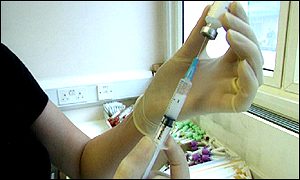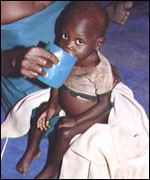| Front Page World UK UK Politics Business Sci/Tech |
| Health |
| Background
Briefings Medical notes |
| Education Entertainment Talking Point In Depth AudioVideo |

 |
 The BBC's Ben Brown The BBC's Ben Brown"A breakthrough with potentially enormous consequences"  real 28k real 28k
 Peter Piot of UNAIDS talks to the
BBC: Peter Piot of UNAIDS talks to the
BBC:"We are very very positive, very thrilled"  real 28k real 28k |

 |
The move is a huge boost for Africa where the UN estimates more than 11 million people have died of the disease and more than 22 million have HIV which can lead to Aids.
 Many children are among the Aids
victims |
"People with HIV will benefit from this deal."
Five major firms which make patented HIV drugs announced after talks with the United Nations that they would cut prices and introduce other initiatives to improve access to their products.
A spokesman for one of the five, the UK-based Glaxo-Wellcome, said prices would be cut immediately by 85%.
Funding call
The firm's combination therapy, Combivir - previously costing an average of $16.50 a day - would be slashed to $2 a day, said the spokesman.
The Swiss giant Roche says its products will also be cut substantially in price, and it will offer free logistics support.
The other firms involved in the deal are two US companies - Merck and Bristol-Myers Squibb - and the Germany firm Boehringer Ingelheim.
 The US Government has declared Aids a
threat to national
security |
"This is the starting point of the process," she said.
"We are calling for a much greater effort by governments, societies and donor countries to improve the health systems and infrastructures, because without that people will not be able to access these drugs," she said.
Mrs Brundtland said the drugs companies were responding to public pressure to act on the unfairness of a situation in which the cost of treatment was beyond the reach of poorer countries.)
The US described as "very substantial" its announcement that it would no longer automatically seek to stop African countries from licensing or developing generic forms of drugs patented by US pharmaceutical companies.
Research fears
The move follows a recent declaration that Aids was a national security threat to the US.
Drugs companies have described the US decision as "undesirable and inappropriate".
They argue that giving permission to local drug manufacturers in Africa to make generic copies of Aids-fighting drugs violated patent regulations and could damage future research.
"We recognise that Aids is a major problem, but weakening intellectual property rights is not the solution," said Alan Holmer, president of the Pharmaceutical Research and Manufacturers of America.
| Search BBC News
Online | ||
Advanced search options | ||
The BBC is not responsible for the content of external internet sites